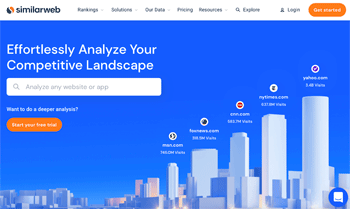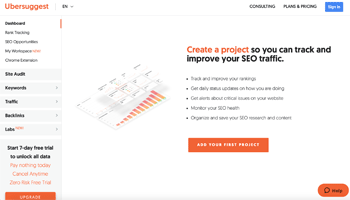Competitor analysis can be boring but highly important for any business, so if you have just started your website business and have no idea, you will need to learn how to go about it at some point. Studying the competitors' strategies and finding ways to improve upon them is not as difficult as you think. It’s just time-consuming, and time-consuming means soul-breaking sometimes. Because the volume of content that you need to fix may not be something you want to see.
The strategies that top sites are taking can be applied to your website. Whether you are working on affiliate marketing or an e-commerce business, you want to make sure that your website is the best it can be. Inevitably, you need to know who your competitors are and what they are doing right.
From there, you can start to develop your own plans for how to improve your own website and search engine ranking. Let me show you how to find your competitors first. Then you will learn how to beat them so you can increase the volume of traffic and ultimately, boost your revenue.

Why Should I Know My Competitor Websites?
So why should you care about your website competitor? Because if you know what they are up to, you can come up with ways to stay one step ahead, hence keep ensuring that your website is the one that comes out on top. Keep an eye on some of the top-performing websites, and you can always anticipate their next move and make changes to your own website accordingly.
But there is another reason. Oftentimes, you can find your own blind spots by criticising others. No website is perfect. When you visit any website as a user, don’t you find some faults at times? For example, images are taking too long to render or the page is eating up your browser memory because of popup videos or ads on that particular page.
So you can learn from the faults that others are making and make sure that the same things aren’t happening on your site.
How To Find Your Competitor Websites
There are several types of tools that you can use to find your competitors' websites.
SEO Keyword Research Tools
If you are already blogging, you should be using at least one keyword tool. A free tool such as Google Ad's Keyword Planner or Wordtracker may still be useful, but premium tools such as Jaaxy will show you the top sites that use the same keywords.
Try 30 x keywords for FREE with Jaaxy:
Competitive Analysis Tools
Another way is to use a competitive analysis tool like SEMrush or SpyFu. These tools will help you to see how much traffic your competitors are getting for specific keywords, and also give you an insight into their backlink profiles and other SEO activity.
Google Alerts
Google Alerts is free. It allows you to create an alert for specific keywords related to your business. Whenever someone mentions those keywords on the internet, you will receive an email notification. This is a great way to keep track of what your competition is up to.
Google Analytics Academy
Google Analytics Academy teaches you;
- How Google Analytics works
- How to set up a Google Analytics account and property
- How to navigate the Google Analytics interface
- How to use reports to understand your website traffic
- How to set up goals and track conversions
- How to create custom dashboards and reports
- How to use Google Analytics 4, Google's next-generation measurement solution
The information you get is very valuable in terms of understanding your competition and making changes to your site.
Once you have a good idea of who your main competitors are, you can start to take a look at their websites and see what they are doing well, and where they could be improved.
How to Identify What Your Website Competitor is Doing Better Than You Are
Your website competitor is doing better than you in a number of ways. They have more traffic, higher Google Rankings, and more social media followers. Here are some tips on how to identify what your website competitor is doing better than you so you can improve your own website:
1. Check Their Traffic Volume

SimilarWeb
Use a tool like SimilarWeb or SEMRush to see how much traffic they are getting compared to your own website. If they have a significantly higher amount of traffic, they are likely doing something better than you in terms of SEO or marketing.
2. Look At Their Google Rankings
Use a tool like Moz or SEMRush to see where your competitor's website ranks for key search terms compared to your own website. If they are consistently ranking higher than you, they are likely doing something better in terms of SEO or content marketing.
3. See How Many Social Media Followers They Have
Check out their Facebook page, Twitter, Instagram, etc., to see how many followers they have compared to your own accounts. If they have significantly more followers, they are likely doing a better job with social media marketing.
How To Improve Upon What Your Competitor Websites Are Doing Better Than You
Here are some tips to identify your competitors’ strong points and replicate them on your site.
- Take a look at their design and layout. Is their design more user-friendly and visually appealing than yours? If so, consider revamping your own design.
- See what kind of content they are putting out. Are they writing articles that are informative and engaging? If so, start creating similar content for your own website.
- Check out their social media presence. Are they actively promoting their website and blog on social media platforms? If so, start focusing on promoting your own site on social media as well.
How To Beat Your Website Competitors

Now, even if you have managed to replicate your competitors’ success formulas on your page, you still might not be getting the traffic or conversions that you desire. Why? Because your competitors might be doing a better job than you are at marketing their website!
I will now show you some simple marketing techniques that eventually help you to outrank others in search engines. They may sound stupid they can be very effective.
Who Your Current Visitors Are and Who You Want Them To Visit
We all often talk about “identifying who our audience is”. But just knowing who they are won’t help. Because some keywords or topics in your past blog posts may have triggered a certain type of audience but they may not necessarily be the audience you wish you target.
When it comes to blogging, everyone has a different writing style and different opinions to share. Not everyone in your niche can be your real competitor. This means that you need to pick several websites and compare them to your site;
- Pick 5-10 top-performing websites in your niche by analyzing their website traffic data.
- Visit each site.
- See if the site owner or the writing styles are similar to yours. For example, if you are a man in your 40s from the USA, your writing style may be very different from a Dutch female blogger in her 20s. You can narrow down the list of your “real” competitors.
- Check each of your “real” competitors’ sites, and write down the topics they write about. For example, the title “What Is An Autoresponder?” means the blogger is targeting someone who may be interested in email marketing but very little knowledge of it.
- What kind of visitors are leaving comments on their site, and you’ll also be able to their knowledge level.
This will help you clarify what kind of audience you really want before you can start creating content to beat them.
What Are Their SEO Efforts?

Ubersuggest
So what are they writing about that is resonating with their audience? What topics are they covering that you could be covered too?
Once you find that out, take a look at their SEO efforts. Are they ranking for any keywords that you want to be ranking for? If so, how can you improve your own SEO efforts to outrank them?
Ubersuggest Chrome extension is a great keyword search volume tool that allows you to find similar keywords as your competitor is using but with better search volume per month.
Find Your Unique Selling Proposition (USP)
Your unique selling proposition is what makes you different from your competitors. It's what sets you apart and makes you unique. If you can find and articulate your USP, you'll be well on your way to beating your website competitors.
So what is your USP? You can ask yourself questions such as;
- What is it that I can offer that my competitors may struggle to offer?
- What do I better that they do? The design layout? English? Analytical skills? Humour?
- What elements on my website are missing from theirs?
Once you've pinpointed what makes you different, make sure it's prominently featured on your website.
You can only find out your USP by taking some time to look at their websites and analyse their performance; what they're doing right and wrong.
Alternatively, you can create your USP by positioning yourself as the opposite of them. For example, if they're all about low prices, emphasise quality instead.
Once you have a strong USP, make sure it comes across loud and clear on your website. Your homepage should feature your USP prominently, and every page on your site should reinforce it. If you can effectively communicate what makes you different from your competitors, you'll be well on your way to beating them online.
Create Content That Your Competitors Haven’t Tapped Into
Thousands of content marketing bloggers are saying that your blog content should be high quality if you want to stand out from your competitors. But they don’t know what they’re talking about. It should be well-written, and any data that you mention on your site should be accurate and useful, yes. But when it comes to their own content, they have no clue what they are doing.
No matter how high the quality of your content is, if what you are saying is basically the same as others, there’s very little chance that you can outrank them on SERP.
Here is one thing you can do. Find some extended topics to the main topic and talk about areas that your competitors have not tapped into. Then add these extended topics to your post.
For example, if your niche is pet products and you are writing healthy dog food, all others are probably 100% focused on;
- Healthy dog food in general.
- Vet-recommended dog food.
- Human food (e.g. vegetables, bread) that dogs can eat.
- Weight control food for dogs, etc.
You can write about them too, but spice up your page by adding extra content that others would have chosen to write as a separate blog post, such as;
- The American story of healthy dog food.
- The misconception of dog health food in Far East Asia.
- Dog food’s expiry dates and the manufacturers’ advice, etc.
You may also want to create a fresh blog post about dog food’s expiry dates. Then do so. Write from scratch again using different keywords, and also add extra content that talks about something else that’s indirectly related to the topic.
By taking the time to find content that others haven’t, and keeping your blog up-to-date this way, you will be able to beat your website competitors.
Promote Your Website
Promote your website across social networks and publication sites like hell. It’s time-consuming, but if you post the summary of your content persistently every day with hashtags and one relevant image, you will receive more visitors over time, and more users will start to pay attention to any of your blog posts. You can promote it on a variety of networks such as;
- Market Hive
- Imgur
- VKontakte
- Google Business Profile
- Mewe
- Scoop.it
- Xing
- Tumblr
- As well as other major networks, i.e. Facebook, Instagram, Twitter, and Pinterest.
Ditch Ads That Slow Your Site Down
Do you display advertisements on your website? If so, what kind of ads are they? Banner ads, or especially video ads, embedded on your page can increase the amount of time it takes for the whole page to load. And if your website performs slowly, you’ll lose in this stupid search engine battle, i.e. your ranking will be negatively affected.
Ads can slow your page down for a few reasons, because;
- Ads are often hosted on external servers, and the browser has to wait for the ad to load before it can continue loading the rest of the page.
- Ads can use up the users’ valuable resources such as bandwidth and CPU power, which can slow down their browsing experience, leading them to leave your site.
- Some ads are programmed to auto-refresh, which can further slow down a website.
To fix the speed issue caused by the ads, here are a few things you can do (unless you are a techie and know how to program to speed it up!)
- Use smaller ads.
- Instead of embedding the code given by the advertising company (or affiliate program) to display a banner ad, download the banner image, upload it on your site and place your link manually.
- Try using a faster content delivery network (CDN) such as Amazon CloudFront to serve your ads.
- If the revenue you’re receiving from your ads is low, they may not worth it. You might as well take them down completely!
How To Find Your Competitor Websites and Win The Stupid Search Engine Battle: Conclusion
I hope you have a pretty good idea of how to research and analyze your website competitors. Keep monitoring your competition and you should be able to stay one step ahead in this ridiculous search engine battle and ensure that your website is always the top choice for your target audience.
What Do You Advocate?

